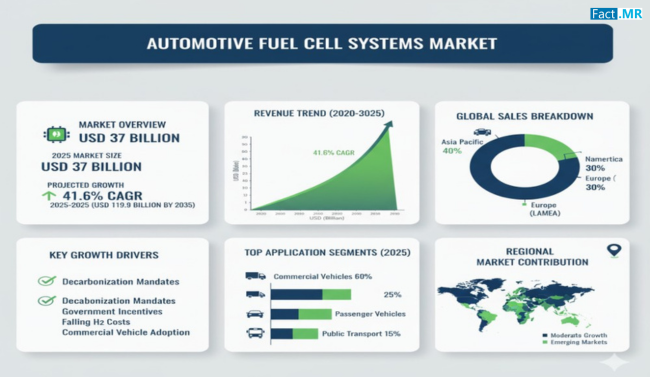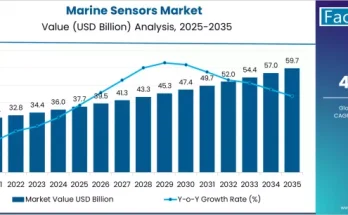As the automotive industry embraces sustainable mobility solutions, the automotive fuel cell systems market is emerging as a pivotal technology for zero-emission vehicles. Fuel cell systems, which generate electricity through the electrochemical reaction of hydrogen and oxygen, offer an efficient and environmentally friendly alternative to traditional internal combustion engines.
The adoption of fuel cell vehicles is accelerating due to increasing environmental awareness, stricter emission regulations, and the global shift toward clean energy. This transformation highlights the potential of automotive fuel cell systems to redefine transportation by combining high performance with sustainability.
Market Overview
Automotive fuel cell systems consist of fuel cell stacks, hydrogen storage units, power electronics, and auxiliary components that collectively enable electric propulsion. Unlike battery-electric vehicles, fuel cell systems produce electricity on demand, allowing for longer driving ranges and faster refueling times.
The market is driven by technological advancements in fuel cell efficiency, durability, and cost reduction. Manufacturers are focusing on lightweight designs, improved hydrogen storage, and enhanced power output to increase system reliability and performance. Additionally, integrating fuel cell systems with hybrid configurations and advanced vehicle control systems is enhancing operational efficiency and expanding adoption across multiple vehicle types.
Growing investments in research and development, strategic partnerships, and government support for hydrogen infrastructure are further accelerating the deployment of fuel cell systems in passenger cars, buses, and commercial vehicles.
Regional Insights
The automotive fuel cell systems market exhibits distinct regional adoption patterns, influenced by regulatory frameworks, infrastructure development, and consumer demand.
North America is a significant market due to early adoption of hydrogen fuel cell technologies, supportive government policies, and investment in hydrogen refueling stations. Automotive OEMs in the region are actively developing fuel cell vehicles to align with sustainability goals and meet growing consumer interest in zero-emission mobility.
Europe is witnessing rapid growth, driven by stringent emission regulations, strong environmental policies, and a focus on decarbonizing transportation. European countries are investing in hydrogen infrastructure, research initiatives, and fleet deployment programs, enabling wider adoption of fuel cell vehicles.
Asia-Pacific is emerging as a key market due to rising automotive production, government incentives for clean mobility, and a growing focus on hydrogen-based technologies. Countries in the region are actively promoting fuel cell buses, trucks, and passenger vehicles to address urban air pollution and reduce dependence on fossil fuels.
Other regions, including Latin America and the Middle East & Africa, are gradually exploring fuel cell technologies as part of their clean energy transition strategies, with pilot programs and infrastructure development paving the way for future growth.
Key Trends & Forecast
Several key trends are shaping the automotive fuel cell systems market:
- Hydrogen Infrastructure Expansion: Development of hydrogen refueling networks is critical for increasing consumer confidence and enabling mass adoption of fuel cell vehicles.
- Cost Reduction and Efficiency Improvements: Advances in fuel cell stack technology, material innovations, and manufacturing processes are reducing costs while enhancing system performance.
- Integration with Hybrid Systems: Fuel cell-electric hybrid vehicles are gaining traction, offering optimized energy management, extended range, and improved efficiency.
- Collaboration Between Industry and Government: Public-private partnerships are supporting research, infrastructure development, and pilot projects, accelerating commercialization of fuel cell vehicles.
- Focus on Heavy-Duty and Commercial Vehicles: Fuel cell systems are increasingly applied in buses, trucks, and commercial fleets due to long-range capabilities and rapid refueling advantages.
- Technological Innovation: AI-enabled energy management, advanced thermal management systems, and lightweight designs are enhancing performance and reliability of fuel cell systems.
These trends indicate strong momentum for automotive fuel cell systems as the market evolves toward high-performance, zero-emission transportation solutions.
Applications & End-Use Outlook
Automotive fuel cell systems are increasingly utilized across a range of vehicle types and sectors:
- Passenger Vehicles: Fuel cell cars provide extended driving ranges, fast refueling, and emission-free operation, making them a viable alternative to battery-electric vehicles.
- Commercial Vehicles: Trucks, vans, and delivery vehicles are adopting fuel cell systems for long-distance operations, reducing downtime and emissions.
- Public Transportation: Fuel cell buses are gaining popularity in urban areas, offering clean and quiet operation while meeting public transport efficiency standards.
- Fleet Management: Logistics and corporate fleets are integrating fuel cell vehicles to achieve sustainability targets and minimize operational costs associated with conventional fuel consumption.
- Specialty Vehicles: Fuel cell systems are applied in niche sectors, including material handling, airport ground support, and off-road mobility solutions, where zero-emission operation and extended range are critical.
The versatility of fuel cell systems across vehicle segments demonstrates their potential to drive decarbonization and operational efficiency across the transportation ecosystem.
Conclusion
The automotive fuel cell systems market is poised to play a transformative role in the global shift toward sustainable mobility. By providing zero-emission propulsion, high efficiency, and long-range capability, fuel cell systems offer an attractive alternative to traditional and battery-electric vehicles.
As technological advancements, hydrogen infrastructure development, and regulatory support continue to grow, fuel cell systems will become increasingly viable for passenger, commercial, and public transportation applications. Adoption of these systems is expected to accelerate globally, contributing to reduced emissions, energy efficiency, and cleaner transportation networks.
Automotive fuel cell systems represent more than an alternative propulsion technology—they embody the future of sustainable, high-performance, and environmentally responsible mobility, offering a pathway to decarbonized transportation across multiple vehicle segments.
Browse Full Report – https://www.factmr.com/report/automotive-fuel-cell-systems-market a



